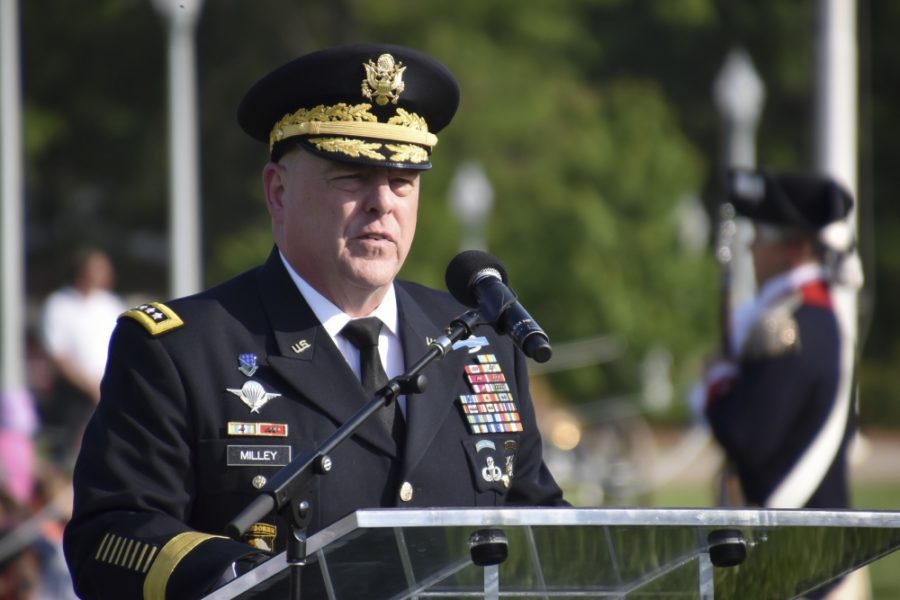The next Chairman of the Joint Chiefs of Staff could well be an Airman or Guardian, hinted Gen. Mark A. Milley, the current CJCS, while speaking at the graduation ceremony for the U.S. Air Force Academy on May 26.
Milley pointed toward Air Force Chief of Staff Gen. Charles Q. Brown Jr. and Space Force Chief of Space Operations Gen. John W. “Jay” Raymond as the obvious candidates.
“I want to thank the next Chairman of the Joint Chiefs of Staff—it’s going to be either Brown or Raymond. Take your pick, Space or Air Force,” Milley said in a half-joking tone after thanking Acting Air Force Secretary John P. Roth for his attendance.
Milley then playfully polled the crowd of graduates and family members in attendance, asking them to cheer if they wanted Brown, then Raymond. He proceeded to acknowledge others in attendance, including senior enlisted adviser to the Chairman of the Joint Chiefs Ramon “CZ” Colon-Lopez.
Milley began a four-year term as Chairman in October 2019 as the 10th member of the U.S. Army to hold the position. In contrast, Gen. Richard Myers was the last Airman to serve as CJCS, holding the job from 2001 to 2005. Since the founding of the Air Force as a separate branch in 1947, only four Airmen have ever ascended to the role.
The Space Force, founded in 2019, has never had a Chairman come from its ranks. In fact, Raymond is the first leader of the nascent service, which falls under the Department of the Air Force.
Getting Airmen into higher level joint roles was a top priority for the last Chief of Staff of the Air Force, Gen. David L. Goldfein.
The importance of joint cooperation between branches was a common theme in Milley’s commencement speech, as he noted early on that “the reason I am alive today, it is you.”
“The reason so many other United States Army infantry, Special Forces are alive today, it’s because we had pilots of enormous courage, who went through thick or thin, when we called in close air support, and we said, ‘Mark my boss, purple smoke, 200 meters due north,’ and you rolled in, and all we cared about was steel on target,” Milley said. “We didn’t care about the color of your uniform. We’re a joint force—one team, one fight, every day, all day, day and night, and the enemy should never forget it.”
Milley also stressed the importance of deterrence, noting increasing tensions with other global superpowers and the need to maintain “real capability” to ensure peace.
“We are now in the 76th year of the great power peace following World War II, and the structure is under stress. We can see it fraying at the edge. With history as our guide, we would be wise to lift our gaze from the never-ending urgency of the present and set the conditions for a future that prevents great power war. Right now, we’re in a great power competition with China and Russia. And we need to keep it at competition and avoid great power conflict.”
Central to preventing tensions from flaring into war, Milley said, will be Airmen and Guardians making “hard choices with imperfect information,” a similar message to one Brown has sounded.
With the growth of technology, “revolutionary change is going to occur” while this year’s graduates are still in service, Milley warned, and it will occur at such a pace that the next generation of USAF leadership will “likely have very little time to correct the mistakes that my generation has made.”
To that end, Milley urged the new graduates to be aggressive in trying to confront and solve future problems now, hoping to give the U.S. a competitive advantage in the future that will either deter or win wars.
“You, the members of the Air Force, the members of the Space Force, are going to be key to our nation’s deterrence. In addition to your innovation, your skill, your readiness, your competence, the real military capability that you’re going to develop, you’re also going to need something else. You’re going to need an incredible character in order to deter, and if deterrence fails, in order to win.”
